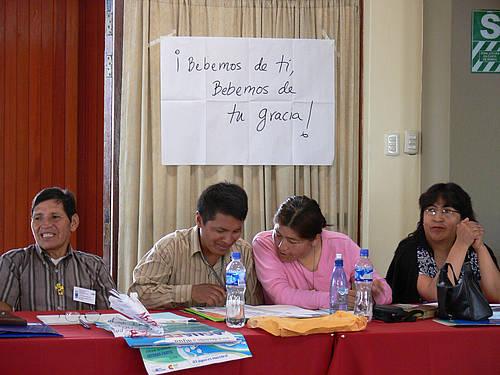"Water should be for everybody, because it is the blood of Mother Earth." These were the words of Peruvian Congresswoman María Sumire during her speech at the conference on "Water for Life and Creation", held in Lima, Peru, 23-25 November.
The meeting was organized by the Ecumenical Water Network (EWN) and the Latin American Council of Churches (CLAI).
The meeting brought together ministers from various denominations, priests, lay people, environmental technicians and administrators, social movement and political leaders, geologists, trade unionists, journalists, representatives of non-governmental organizations and leaders of indigenous communities from Costa Rica, Guatemala, El Salvador, Brazil, Colombia, Peru, Bolivia, Ecuador, Argentina, Chile, Uruguay, Paraguay and Germany.
The meeting aimed to develop a human rights-based approach to water, that is, the right of every person and community to have access to sufficient, safe and affordable water of an acceptable quality. The meeting analyzed this issue from an ethical-theological perspective challenging the church to take a critical stand against water being controlled by a few and denounce the way that the poorest and most vulnerable communities have to pay most for something to which they scarcely have access. Faced with this implementation of a "development" model that plunders resources and oppresses the weakest the church cannot and must not remain unmoved.
"God is the centre of values and attitudes - not dogma. To be a Christian today, it is not enough to only make a declaration of faith. To have a relationship with God is to have a relationship with your own rights and those of everybody else," said Pastor Rafael Goto. He added that every human action must focus on rebuilding a community (koinonía), in which participation and solidarity must be paramount and in which ethics must be the code and common denominator regulating relations of justice and welfare. He added that shalom is not only synonymous with tranquillity and peace, but also with every human being’s commitment to act responsibly in a world where goods are not held in common. He went on to say that we must all see ourselves to be both owners and servants, that we must all live together and take responsibility for promoting unity above and beyond our faith perspective.
Michael Windfuhr, chair of the EWN Steering Group, said that states have a duty to respect, protect and guarantee the right of access to safe water and that no state has the right to restrict the access of some sectors of society.
The three-day conference focused on the need for water management to always be endorsed by communities, which should organize to protect their right to water. Participants spoke about the experiences of their countries and described how communities struggle on as many fronts as possible, even at the risk of the safety and lives of community leaders.
Participants also made field visits to Lima's urban periphery to observe the vitality and strength of community organizations that have taken responsibility for promoting change and transforming their communities.
At the close of the consultation, participants established a mechanism to promote continuity and monitoring of the individual and institutional commitments made at the conference. These focus on strengthening biblical-theological reflection; public information and education; public and political participation and advocacy, as well as strengthening ecumenical networks at the local, national and regional levels.
The EWN is a global network of churches and Christian organizations that are addressing the water crisis. It promotes information exchange between churches and related organizations. The network is based at the World Council of Churches (WCC) offices and the WCC facilitates cooperation between participants. CLAI is a member of the EWN.
